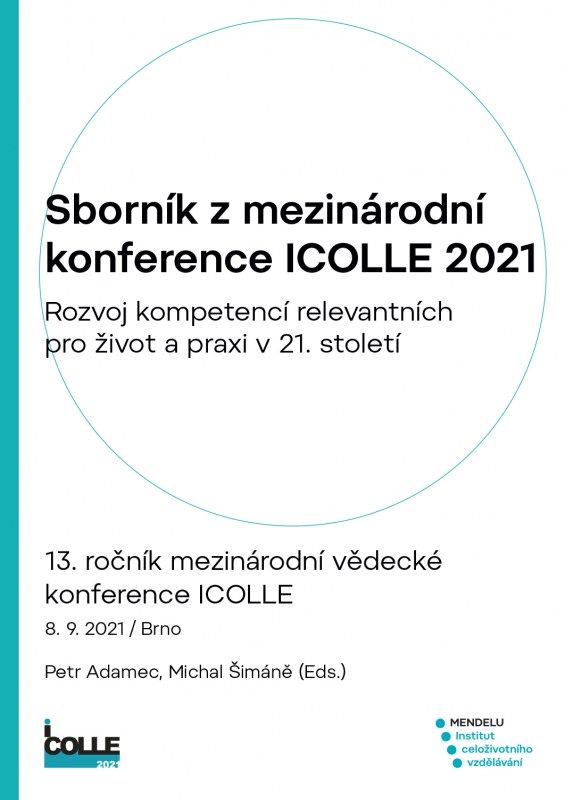
DOI: 10.11118/978-80-7509-832-0-0034
CHARACTER MATTERS ČILI NA CHARAKTERU V PEDAGOGICE ZÁLEŽÍ
- Jan Hábl
Teaching a child to read, write or count represents a certain didactic art on the part of the teacher. Current pedagogy is quite advanced in this respect. She has made tremendous progress over the last few hundred years. There are countless excellent methodological strategies for imparting a wealth of information, facts and skills to a child. But what makes pedagogy a problem is learning the good, educating the character. The amount of knowledge since the science and technology revolution has grown exponentially, educational curricula overloaded, the amount of data and information is so overwhelming that there is no time to address their moral aspects. Theoretically, we know that education or school in general should not be just about passing on knowledge, in each handbook such as Introduction to Pedagogy, Fundamentals of Pedagogy, etc., we read that in addition to the so‑called cognitive goals, we must also pursue affective goals. We must shape the moral component of character. We have to teach good. But can we do it? Is it possible at all? Is there a method for this?
Keywords: character; teacher; education; moral formation
pages: 34-41, online: 2022
References
- Aristoteles (1937). Etika Nikomachova. Překlad Antonín Kříž. Praha: Jan Laichter.
- Arthur, J., Kristjánsson, K., Harrison, T., Sanderse, W., & Wright, D. (2017). Teaching character and virtue in schools. London: Routledge.
 Go to original source...
Go to original source... - Baldermann, I. (2004). Úvod do biblické didaktiky. Jihlava: Mlýn.
- Campbell, V., & Bond, R. (1982). "Evaluating a character education curriculum." In McClelland, D. (ed.). Educating for values. New York: Investigation Publishers.
- Čapková, D. (1977). Některé základní principy pedagogického myšlení J. A. Komenského. Praha: Academia.
- Hábl, J. (2013). Učit (se) příběhem. Komenského Labyrint a didaktické možnosti narativní alegorie. Brno: Host.
- Hošek. P. (2010) "Proměňující moc příběhu". Církevní dějiny, 3(5).
- Hunter, J. D. (2000). Death of character. Moral education in an age without good and evil. New York: Basic Books.
- Komenský, J. A. (1946). Didaktika analytická. Praha: Samcovo knihkupectví.
- Komenský, J. A. (1926). Didaktika česká. Národní knihtiskárna I. L. Kober v Praze, 4.ed.
- Komenský, J. A. (1905). Didaktika velká. Praha: Dědictví Komenského.
- Komenský, J. A. (1927). Hlubina bezpečnosti. Praha: Spolek Komenského.
- Komenský, J. A. (1992). Obecná porada o nápravě věcí lidských, sv. I, II, III. Praha: Svoboda.
- Koten, J. (2013). Jak se dělá fikce slovy. Brno: Host.
- McLaughlin, T. H., & Halstead, M. (1999). Education in Character and Virtue, In Halstead M., & McLaughlin, T. (eds.), Education in Morality. London: Routledge.
- Platon. (2000). Euthydémos, Menón. Praha: Oikoymenh.
- Sanderse, W. (2012). Character education. A neo-Aristotelian approach to the philosophy, psychology and education of virtue. Eburon: Delft, Nehtrelands.
- Trávníček, J. (2003). Příběh je mrtev? Schizmata a dilemata moderní prózy. Brno: Host.
- Trávníček, J. (2007). Vyprávěj mi něco. Jak si děti osvojují příběhy. Praha - Litomyšl: Paseka.
- Uhlířová, J. (2003). Role hry v Komenského pedagogické koncepci. Praha: Univerzita Karlova, Pedagogická fakulta, 2003.
- Wringe, C. (2007). Moral education. Beyond the teaching of right and wrong. Dortrecht: Springer.
- Wynne, E. (1991). "Character and academics in the elementary school." In Benninga, J. (ed.), Moral character and civic education in the elementary school. New York: Teachers College Press.


